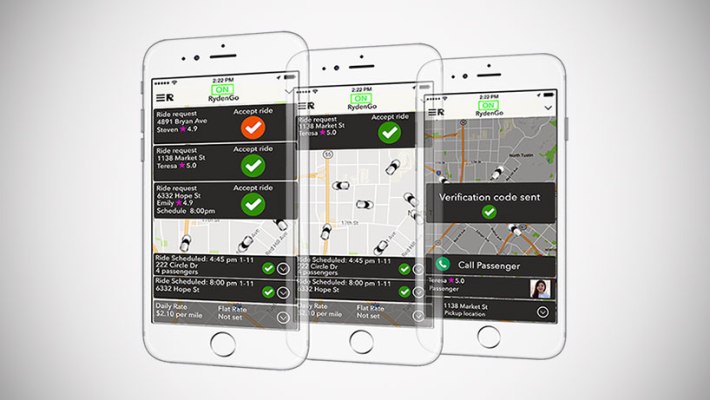On April 13, the state of California issued a cease and desist letter to RydenGo, saying that the company had to take down its website. The letter stated that the ride-hailing startup was operating without a permit from the California Public Utilities Commission (CPUC).
The problem with the order, according to RydenGo CEO Michael Pappas, is that the company is not yet operating. It does have a website, which is still up, and people who would like to drive for RydenGo in the near future are encouraged to sign up for the beta team. But there are no cars to be hailed on the streets yet. “We don’t have apps or anything for download,” Pappas said in a phone interview. “Just the form to be filled out for the future.”
Pappas called the CPUC and spoke with the man who issued the letter. He was told that he needed to take the website down, and then, according to Pappas, the official hung up on him.
“I have never run into anything like this before,” Pappas said. “I’ve heard of it, but those companies are usually farther along.” He went on to explain that “circumstances are different because landscapes are different. RydenGo is needling others and challenging the rideshare industry as it is today. It could change the industry in a positive direction.”
He noted that RydenGo is focusing on developing its corporate culture before beginning operations. “The technology is mature,” Pappas said. “You can get tech like that [a ride-hailing app] built in months. It’s more important to build the company from the top down and what it stands for. RydenGo is driver- and people-centric. We want to give them control and stop exploitation.”
The idea seems to be resonating with people. A week after the cease and desist letter, RydenGo added text to its beta team signup saying that due to the “overwhelming” number of signups, the company would let people add new cities to the company’s short list. Originally, there were about two dozen cities where RydenGo hoped to start operations in the fall; that number could be greater if the beta team is any indication. Several California locations are on the original short list, including Los Angeles, San Diego and San Francisco.
Pappas isn’t arguing with the CPUC’s regulatory role. He understands the need to protect the public and the need for safety, and he agrees with the agency’s role in making that happen. “Ride-hailing companies cannot run on the streets with a beta app. I totally understand and see the need for that,” he said. “But telling us to take down the website — that was the weird part.”
As of April 28, the order had not been pursued nor rescinded by the state of California.
